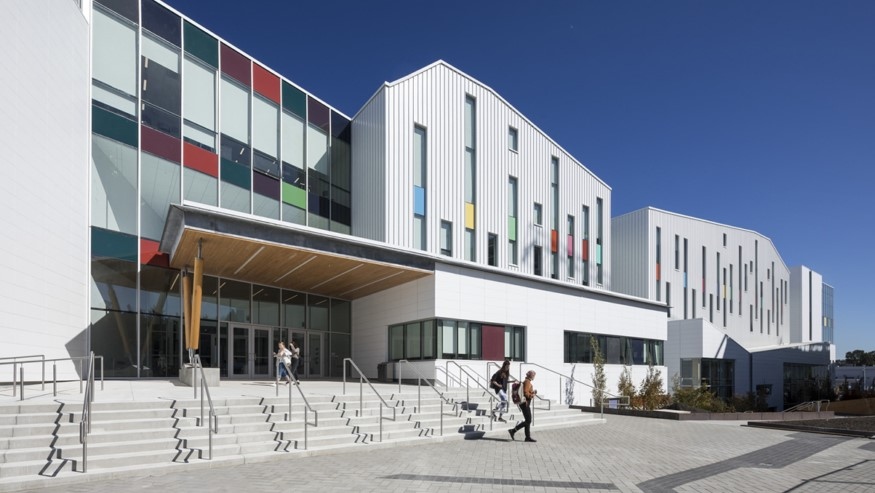Emily Carr students call on B.C. to increase funding for international students, cap fees
 The Emily Carr University campus is seen in this photo provided by the university.
The Emily Carr University campus is seen in this photo provided by the university.
Students at Vancouver’s Emily Carr University are staging a walkout and rally Thursday over a proposed 30 per cent tuition hike for international students.
Dec. 1 is also when the university’s board of governors is scheduled to make its final decision on the fee increases. Organizers of the student protest says the hike would bring Emily Carr an additional $1.8 million in annual revenue while adding $5,941 more to each student’s tuition.
“We are calling on the B.C. government to intervene immediately to pause this cash grab, and invest in Emily Carr University,” Kashish Hukku Jani, a fourth-year, international student at Emily Carr, said in a press release Tuesday. “We need to stop financing university deficits from our most marginalized members. Enough is enough.”
In a notice sent out to students on Nov. 25, Emily Carr laid out several proposed tuition fees, the largest being a 30 per cent hike for international undergraduate students.
Returning international undergrads could face a 10 per cent increase, while incoming international graduate students may pay an extra 5 per cent. A two per cent increase is planned for domestic undergraduate students in 2023.
Before students were set to walk out at 11 a.m., Jani told CTV news she was expecting hundreds of people to participate, and that a few instructors had adjusted their classes so more students could rally. She also said she anticipated the board of governors will vote in favour of the tuition increase later Thursday.
“The fact is , the university is in deficit, we have a really high debt at that. But we need to keep urging the ministry to step in and put a cap on international student fees and increase funding for international students overall,” said Jani.
On its website, Emily Carr notes its tuition is among the most affordable in Canada” and “lower than that of OCAD University, NSCAD University, University of British Columbia and University of Toronto.”
Since international students pay taxes and are expected to help with the national labour shortage, Jani argues they should have the same access to education that leads to those jobs.
Right now, she pays roughly $20,000 in annual tuition as a full time students. Her roommates, who are both domestic students, pay about 20 per cent of what Jani does.
“We’re all living through Vancouver’s inflation and skyrocketing prices.”
CTV News has reached out to the Ministry of Advanced Education for comment.
CTVNews.ca Top Stories

How quietly promised law changes in the 2024 federal budget could impact your day-to-day life
The 2024 federal budget released last week includes numerous big spending promises that have garnered headlines. But, tucked into the 416-page document are also series of smaller items, such as promising to amend the law regarding infant formula and to force banks to label government rebates, that you may have missed.
Which foods have the most plastics? You may be surprised
'How much plastic will you have for dinner, sir? And you, ma'am?' While that may seem like a line from a satirical skit on Saturday Night Live, research is showing it's much too close to reality.
opinion I've been a criminal attorney for decades. Here's what I think about the case against Trump
Joey Jackson, a criminal defence attorney and a legal analyst for CNN, outlines what he thinks about the criminal case against Donald Trump in the 'hush money trial.'
$3.8M home in B.C.'s Okanagan has steel shell for extra wildfire protection
A home in B.C.'s Okanagan that features a weathering steel shell designed to provide some protection against wildfires has been listed for sale at $3.8 million.
Diver pinned under water by an alligator figured he had choice. Lose his arm or lose his life
An alligator attacked a diver on April 15 as he surfaced from his dive, nearly out of air. His tank emptied with the gator's jaws crushing the arm he put up in defence.
Psychologist becomes first person in Peru to die by euthanasia after fighting in court for years
A Peruvian psychologist who suffered from an incurable disease that weakened her muscles and had her confined to her bed for several years, died by euthanasia, her lawyer said Monday, becoming the first person in the country to obtain the right to die with medical assistance.
Mystery surrounds giant custom Canucks jerseys worn by Lions Gate Bridge statues
The giant stone statues guarding the Lions Gate Bridge have been dressed in custom Vancouver Canucks jerseys as the NHL playoffs get underway.
Celebrity designer sentenced to 18 months in prison for smuggling crocodile handbags
A leading fashion designer whose accessories were used by celebrities from Britney Spears to the cast of the 'Sex and the City' TV series was sentenced Monday to 18 months in prison after pleading guilty in Miami federal court on charges of smuggling crocodile handbags from her native Colombia.
Wildfire leads to evacuation order issued for northeast Alberta community
An evacuation order was issued on Monday afternoon for homes in the area of Cold Lake First Nation.
































